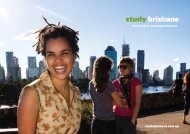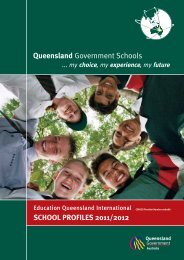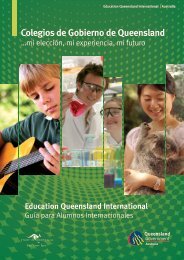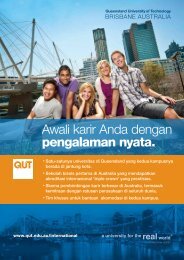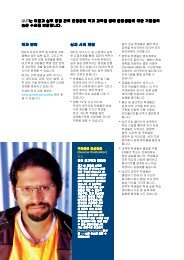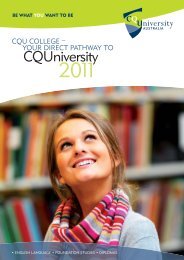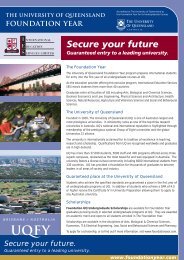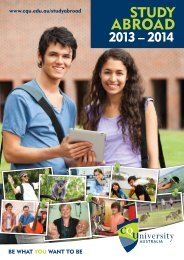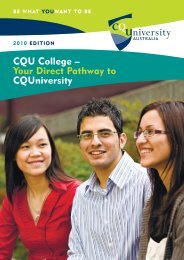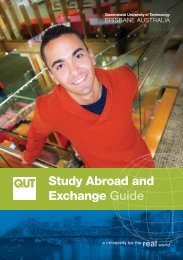UNDERgRADUATE PROSPECTUS - Study Brisbane
UNDERgRADUATE PROSPECTUS - Study Brisbane
UNDERgRADUATE PROSPECTUS - Study Brisbane
- No tags were found...
Create successful ePaper yourself
Turn your PDF publications into a flip-book with our unique Google optimized e-Paper software.
Humanities, Social Science, Education and Arts<br />
Career opportunities<br />
A wide range of careers in internatioanl agencies,<br />
governmental organisations and the global<br />
private sector, both in Australia and around the<br />
world, including UNESCO, UNICEF or the World<br />
Health Organization.<br />
International contact details<br />
International Student Advisor<br />
Online: www.uq.edu.au/international/enquiry<br />
Phone: within Australia (free call): 1800 671 980<br />
Outside Australia: +61 3 8676 7004<br />
Bachelor of<br />
Journalism<br />
Program code 2040<br />
Location St Lucia<br />
Commencement semester 1, 2<br />
Duration Three years full-time<br />
Admission requirements Year 12 or equivalent English<br />
(see page 92)<br />
Honours Available as an additional year of study<br />
Program outline<br />
Journalism is an exciting occupation that allows you<br />
to meet many different kinds of people and to travel.<br />
The basis of journalism is information – discovering,<br />
collecting, assembling, analysing and presenting<br />
information. To do this effectively, journalists<br />
require highly developed skills in language, a good<br />
understanding of the media, an interest in current<br />
affairs and a broad general knowledge. A journalist<br />
must be able to communicate clearly, concisely,<br />
accurately and quickly, and have an inquiring<br />
nature and well-developed people skills. UQ has<br />
offered a highly respected journalism program since<br />
1921, making ours the longest established and<br />
most extensive program in Australia. Our outlook<br />
is progressive and our journalism courses keep<br />
pace with the latest developments in, and thinking<br />
about, journalism. Many distinguished journalists<br />
(in Australia and overseas) participate in activities<br />
associated with the program. More types of<br />
journalism are practised today than ever before as<br />
the number of media outlets proliferates. To stand<br />
out from the crowd, successful journalists need to<br />
enhance their all-round competence with personal<br />
enterprise, innovation, imagination and creativity.<br />
The UQ program encourages you to develop<br />
your own vision of journalism by drawing on our vast<br />
collective experience of journalism practice and our<br />
research into journalism and communication.<br />
Majors<br />
Popular Music<br />
Popular music is an ever-present part of our lives.<br />
It has the power to uplift, stimulate, comfort,<br />
motivate, and communicate like no other art form.<br />
Its attractiveness lies in its ubiquity, openness and<br />
lack of convention. It provides the raw material for<br />
a vast international industry. The courses offered in<br />
the Popular Music major will help you to understand<br />
your own response to music and the society in<br />
which you live. Courses will also help you to express<br />
yourself in writing and in music production, and<br />
inspire you to consider and experience the power<br />
and wonders of music.<br />
Sports Studies<br />
Commencement semester 1<br />
Sports Studies will provide you with an understanding<br />
of the sport and leisure industries from sociological,<br />
historical, economic and psychological perspectives.<br />
You will undertake courses in the social science and<br />
humanities areas of the study of sport, as well as<br />
courses relating to the sociology of sport and the<br />
human body in society. The growth in the sport,<br />
physical activity and health industries over the past<br />
two decades has created a range of employment<br />
opportunities in the areas of social policy, journalism,<br />
management, marketing, planning and development,<br />
education, and psychology.<br />
Career opportunities<br />
Journalist in metropolitan, national and regional<br />
newspapers; commercial radio and television<br />
stations; web and multimedia publications;<br />
specialty interest magazines and allied fields<br />
of publishing; marketing, communication and<br />
public relations; national and overseas news<br />
organisations; self-employment as freelance<br />
journalists and photojournalists.<br />
Dual degree programs<br />
– Arts<br />
– Business Management<br />
– Communication<br />
– Laws<br />
– Science<br />
International contact details<br />
International Student Advisor<br />
Online: www.uq.edu.au/international/enquiry<br />
Phone: within Australia (free call): 1800 671 980<br />
Outside Australia: +61 3 8676 7004<br />
Diploma in<br />
Languages<br />
Program code 1602<br />
Location St Lucia<br />
Commencement semester 1, 2<br />
Duration Two years part-time<br />
Admission requirements Entry to the Diploma<br />
requires admission to a UQ degree program and<br />
eligibility for admission to the Bachelor of Arts program<br />
Additional entry requirements International<br />
students can undertake the concurrent diploma but<br />
they must ensure that the programs are completed<br />
within the timeframe of their student visa.<br />
Program outline<br />
The Diploma in Languages is a way of valueadding<br />
to any Bachelors degree. You will benefit<br />
from the advantage of knowing another language<br />
in the global economy, and you will have an extra<br />
academic qualification.<br />
You will enrol in the Diploma in Languages<br />
concurrently with another UQ degree, the “parent”<br />
program. The program you complete will be<br />
equivalent to a major in a language other than<br />
English as in the Bachelor of Arts degree. You can<br />
either “overload” (enrol in five courses per semester<br />
rather than four) to complete the degree and<br />
diploma in around the same time as the “parent”<br />
program alone; or you can extend the length of time<br />
you are enrolled at university.<br />
Languages available are: Chinese, French,<br />
German, Indonesian, Japanese, Korean, Russian,<br />
and Spanish, or Classical Languages for either<br />
Ancient Greek or Latin.<br />
International contact details<br />
International Student Advisor<br />
Online: www.uq.edu.au/international/enquiry<br />
Phone: within Australia (free call): 1800 671 980<br />
Outside Australia: +61 3 8676 7004<br />
Bachelor of<br />
Music<br />
Program code 2047<br />
Location St Lucia<br />
Commencement semester 1<br />
Duration Four years full-time<br />
Admission requirements Year 12 English, and<br />
Music (see page 92); or AMEB Grade 7 or higher<br />
in a practical examination and AMEB Grade 5 or<br />
higher in Theory or Musicianship, or equivalent<br />
Additional entry requirements Audition and<br />
musicianship test. Go to www.music.uq.edu.au for<br />
Application for Audition forms<br />
Honours Awarded based on the weighted percentage<br />
of specific courses in the program’s final year<br />
Program outline<br />
The Bachelor of Music is intended for those wishing<br />
to pursue a professional career in music, and<br />
integrates the development of practical skills with<br />
theoretical and historical musical knowledge. In<br />
the first year, you will take practical study and may<br />
continue to do so into second year, depending on<br />
your first year results (alternatively, you may take small<br />
group tuition in second year). In the first two years,<br />
you will also take courses in music history, techniques<br />
and aural training, plus electives from popular music<br />
or non-music courses. For your final two years, you<br />
will choose one of the five majors listed below.<br />
Additional information<br />
If you wish to undertake a specialisation in music<br />
education, you can enrol in the Bachelor of Music/<br />
Bachelor of Education, which is a five-year program.<br />
Majors<br />
Composition<br />
In the Composition major, you will receive weekly<br />
individual tuition. You may also perform works in<br />
practical class and ensemble concerts, and will also<br />
have access to the school’s electronic studio.<br />
Composition and Musicology<br />
In this major, you will receive weekly individual<br />
tuition in composition, along with opportunities to<br />
participate in practical activities and ensembles.<br />
At the same time, you will have the opportunity to<br />
develop skills and knowledge in areas of music<br />
scholarship, including studies in music history,<br />
techniques, ethnomusicology, historical performance<br />
practice, and music analysis, culminating in the<br />
completion of an individually supervised thesis (at<br />
honours level) or research project (at pass level). You<br />
will find your career opportunities enhanced by the<br />
critical edge that the scholarly training brings to your<br />
suite of creative skills.<br />
Music Performance<br />
In this major, you will receive individual tuition on<br />
your instrument or voice, in addition to ensemble<br />
preparation. Areas of study include chamber music,<br />
performance practices, conducting, and advanced<br />
aural studies. Practical skills are engaged through<br />
master classes, student performances, debates,<br />
lectures, and seminars on performance related<br />
topics.<br />
Musicology<br />
This area includes a wide range of studies in music<br />
history, techniques, ethnomusicology, historical<br />
performance practice, and music analysis.<br />
Performance and Musicology<br />
In this major, you will receive individual tuition on<br />
your instrument or voice, with opportunities also<br />
to participate in ensemble work. At the same time,<br />
you will have the opportunity to develop skills and<br />
knowledge in areas of music scholarship, including<br />
studies in music history, techniques, ethnomusicology,<br />
historical performance practice, and music analysis,<br />
culminating in the completion of an individually<br />
supervised thesis (at honours level) or research project<br />
(at pass level). You will find your career opportunities<br />
enhanced by the critical edge that scholarly training<br />
brings to your suite of practical skills.<br />
Career opportunities<br />
Composition: professional composers or<br />
arrangers.<br />
Music performance: solo, chamber, orchestral<br />
and vocal performance, or accompanying.<br />
Musicology: music lecturing, research,<br />
criticism, journalism, music programming, arts<br />
administration or librarianship<br />
Generally: music education, music therapy,<br />
broadcasting, event management, recording<br />
engineer, music promoter or producer.<br />
UNDERGRADUATE <strong>PROSPECTUS</strong> FOR INTERNATIONAL STUDENTS 2012<br />
73



